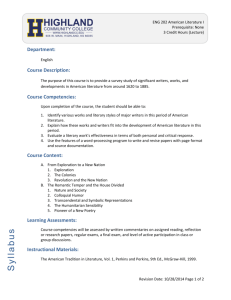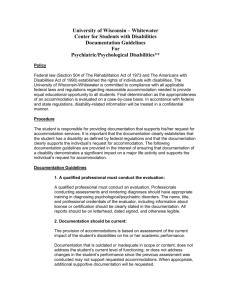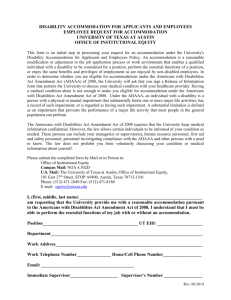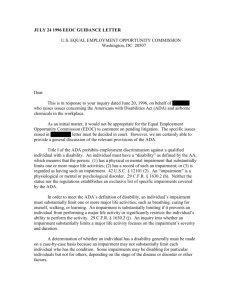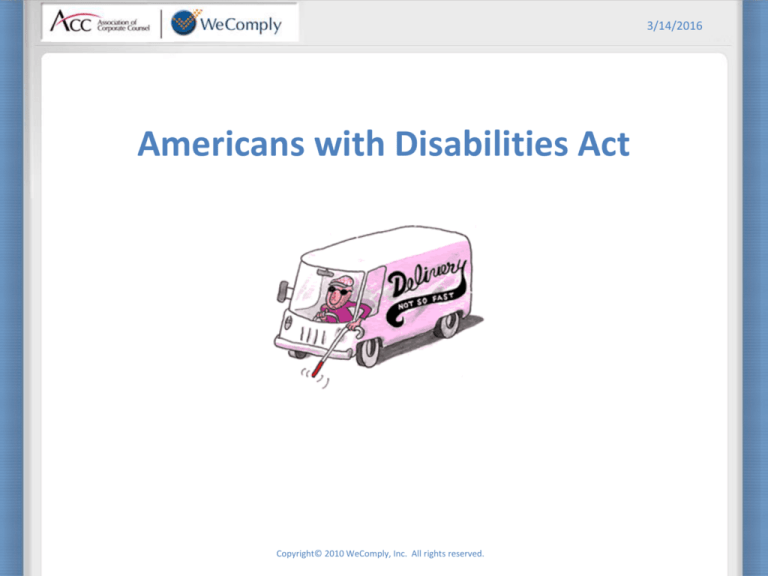
3/14/2016
Americans with Disabilities Act
Copyright© 2010 WeComply, Inc. All rights reserved.
3/14/2016
Americans with Disabilities Act
Copyright© 2010 WeComply, Inc. All rights reserved.
Overview
ADA was enacted in 1990 and revised substantially
effective January 1, 2009
It prohibits employers from —
•Discriminating against qualified persons with disabilities
•Discriminating against employees who have relationship
with disabled person based on relationship
• Retaliating against anyone who participates in charge of disability-based
discrimination
ADA requires employers to make reasonable accommodation for persons with
disabilities
Copyright© 2010 WeComply, Inc. All rights reserved.
3
Persons with Disabilities
ADA applies to persons with disabilities who can perform
essential functions of job, with or without reasonable
accommodation
Person with disability is someone who —
•Has physical or mental impairment that substantially limits
one or more major life activities
•Has record of such impairment, or
•Is regarded as having such impairment
Congress: Definition of "disability" is broad, and determination should not
"demand extensive analysis"
Copyright© 2010 WeComply, Inc. All rights reserved.
4
Persons with Disabilities (cont’d)
ADA applies to persons with disabilities who can perform
essential functions of job, with or without reasonable
accommodation
Person with disability is someone who —
•Has physical or mental impairment that substantially limits
one or more major life activities
•Has record of such impairment, or
•Is regarded as having such impairment
Congress: Definition of "disability" is broad, and determination should not
"demand extensive analysis"
Copyright© 2010 WeComply, Inc. All rights reserved.
5
Persons with Disabilities (cont’d)
ADA applies to persons with disabilities who can perform
essential functions of job, with or without reasonable
accommodation
Person with disability is someone who —
•Has physical or mental impairment that substantially limits
one or more major life activities
•Has record of such impairment, or
•Is regarded as having such impairment
Congress: Definition of "disability" is broad, and determination should not
"demand extensive analysis"
Copyright© 2010 WeComply, Inc. All rights reserved.
6
Impairments
Impairment is a physical or mental disorder
It does not include —
•Normal physical characteristics
•Conditions that are not the result of a disorder
•Personality traits
•Homosexuality/bisexuality
•Socio-economic disadvantages
Copyright© 2010 WeComply, Inc. All rights reserved.
7
Pop Quiz!
True or False: Whether something is considered an impairment under the ADA can
depend on its cause.
A.True.
B.False.
Copyright© 2010 WeComply, Inc. All rights reserved.
8
Major Life Activities
Individual must have impairment that substantially limits one
or more major life activities to be considered disabled
Major life activities include —
•Activities that an average person can perform with little or no
difficulty
Neurological/brain activities — e.g., thinking, learning,
concentrating, communicating
•Major bodily functions
Determination must be made without considering whether person has aids to
lessen impairment's effects
Copyright© 2010 WeComply, Inc. All rights reserved.
9
Major Life Activities (cont’d)
Individual must have impairment that substantially limits one
or more major life activities to be considered disabled
Major life activities include —
•Activities that an average person can perform with little or no
difficulty
Neurological/brain activities — e.g., thinking, learning,
concentrating, communicating
•Major bodily functions
Determination must be made without considering whether person has aids to
lessen impairment's effects
Copyright© 2010 WeComply, Inc. All rights reserved.
10
Records and Perceptions of a Disability
Individuals who do not actually have an impairment may still
qualify for ADA protection:
•People on record as having a disability — e.g., someone who
has been cured of cancer or is in remission
•People "regarded as" having a disability — e.g., person who is
fired because of disfiguring scars
•Employers need not provide reasonable accommodation to
people who are only "regarded as" having disability
Copyright© 2010 WeComply, Inc. All rights reserved.
11
Essential Job Functions
ADA does not require employers to hire or retain
unqualified disabled people
Disabled person must have right educational/professional
background and be able to perform essential functions
Whether a function is essential depends on —
•How much time must be spent performing the function
•Consequences of removing the function
•Whether there are limited people available to perform that function
If function is non-essential or incidental, disabled person's inability to perform it
cannot be used to disqualify him/her
Copyright© 2010 WeComply, Inc. All rights reserved.
12
Pop Quiz!
Pete is a word processor. He, along with a lot of other co-workers, occasionally
answers the phone while Lori, the receptionist, is at lunch or out for a smoke. Is
answering the phone an essential function of Pete's word processing position?
A.Yes, because the phones must be answered when Lori is out.
B.No, because it is incidental to the position.
C.No, because data entry is the essential function.
Copyright© 2010 WeComply, Inc. All rights reserved.
13
Reasonable Accommodation
Some qualified, disabled persons may require reasonable accommodation
Work environment or job must be modified to enable job performance, e.g. —
•Making facilities more accessible
•Reassigning employee to vacant position
•Providing reader or interpreter
•Allowing part-time or modified work schedule
•Job restructuring
•Acquiring or modifying equipment
Need for accommodation may arise any time a person's disability or job changes
Copyright© 2010 WeComply, Inc. All rights reserved.
14
Undue Hardship
We must look to abilities/limitations of employee and job requirements to
determine appropriate accommodation
Goal is effective, reasonable accommodation that —
•Is related to disability
•Is not primarily for personal use — e.g., eyeglasses
•Would not impose "undue hardship" on business operations
Fact that cost of accommodation is high in comparison to employee's salary is not
considered in determination of undue hardship
Copyright© 2010 WeComply, Inc. All rights reserved.
15
In the news…
Copyright© 2010 WeComply, Inc. All rights reserved.
16
Qualification Standards
ADA does not require us to lower productivity or quality
standards for disabled employees
Standards we use must not have discriminatory purpose
and must be applied equally to all employees in same job
Standard tending to screen out individuals because of their
disabilities must be —
• Job-related
• Consistent with business necessity
• Disabled employees cannot be screened out if they could satisfy the standards
with reasonable accommodation
Copyright© 2010 WeComply, Inc. All rights reserved.
17
Safety Standards
Company may set employee-qualification standards
necessary to protect public and other employees from
direct threats to health and safety
Standards must —
•Present specific, current and significant risk of substantial
harm
• Allow for reasonable accommodation to reduce risk to acceptable level
• Federal or state regulations may restrict how company implements its standards
Copyright© 2010 WeComply, Inc. All rights reserved.
18
The Hiring Process
Employers must provide reasonable accommodations to ensure that everyone has
equal opportunity in hiring process
Required accommodations may include —
•Wheelchair-accessible interviewing facilities
•Sign-language interpreter for deaf applicants
•Reader for applicants with dyslexia who are asked to take written test
Hiring process must focus on applicant's abilities — not possible disabilities
Process should address ability of applicant to perform essential job functions, with
or without accommodation
Copyright© 2010 WeComply, Inc. All rights reserved.
19
Pop Quiz!
Ted is interviewing John for a position that requires heavy lifting. Another person
who Ted hired quit after having back problems, and he wants to avoid the same
issue with John. Which of the following questions would be acceptable to ask?
A.Have you ever had a back injury?
B.Do you take any pain medication?
C.Are you able to lift 60 pounds?
D.Has your spine even been x-rayed?
Copyright© 2010 WeComply, Inc. All rights reserved.
20
The Hiring Process (cont’d)
Limit questions about attendance to —
Previous work-attendance records
Whether applicant feels he/she will be able to meet attendance
policy
We may ask applicant to demonstrate how he/she will perform job functions
only if —
•Everyone applying for job is asked, or
•Applicant has known disability that would appear to interfere with/prevent
performance of job-related function
If we use tests to determine whether applicant meets job-related qualification
standards, we must use them with all applicants
Copyright© 2010 WeComply, Inc. All rights reserved.
21
Medical Exams and Questions
We may require prospective employees to undergo
medical exams or ask them medical questions only if it
is —
•Related to job performance
•Done after conditional job offer is made
•Required for all entering employees in same job class
• Before withdrawing conditional offer, we must determine that there is no
reasonable accommodation that would allow the prospective employee to
perform essential functions of job efficiently and safely
• Decision to withdraw conditional offer must be job-related and consistent with
business necessity
Copyright© 2010 WeComply, Inc. All rights reserved.
22
Medical Exams and Questions (cont’d)
We may require prospective employees to undergo
medical exams or ask them medical questions only if it
is —
•Related to job performance
•Done after conditional job offer is made
•Required for all entering employees in same job class
• Before withdrawing conditional offer, we must determine that there is no
reasonable accommodation that would allow the prospective employee to
perform essential functions of job efficiently and safely
• Decision to withdraw conditional offer must be job-related and consistent with
business necessity
Copyright© 2010 WeComply, Inc. All rights reserved.
23
The ADA on the Job
ADA applies to all aspects of the job
Employees must have equal access to —
•Training
•Employer-sponsored social functions
•Break rooms
•Other non-work facilities that company provides
Copyright© 2010 WeComply, Inc. All rights reserved.
24
In the news…
Copyright© 2010 WeComply, Inc. All rights reserved.
25
Evaluations and Promotions
Employees with disabilities should be held to same
performance standards as others in same position
Employees who require accommodation should be
evaluated on ability to perform essential job functions
with the accommodation
When addressing employee performance issues —
• Focus on facts
• Don't try to diagnose disability that may or may not be cause of performance
problems
• Employees with disabilities should receive equal consideration for advancement
Copyright© 2010 WeComply, Inc. All rights reserved.
26
3/14/2016
Final Quiz
Copyright© 2010 WeComply, Inc. All rights reserved.
3/14/2016
Questions?
Copyright© 2010 WeComply, Inc. All rights reserved.
3/14/2016
Thank you for participating!
This course and the related materials were developed by
WeComply, Inc. and the Association of Corporate Counsel.
Copyright© 2010 WeComply, Inc. All rights reserved.


